- Home
- Steve Rasnic Tem
Ugly Behavior Page 2
Ugly Behavior Read online
Page 2
That’s what I wanted to say, but knew I would not. In fact, just the thought of saying those things made me tremble. I thought my trembling might be noticeable, given the odd way my father was looking at me.
Instead, I told him, “Dad, this is… my old friend Tommy. Tommy, my dad.” I kept thinking about something my dad once said. Something like, politeness doesn’t get us what we need, sweetheart. In fact, worst come to worst, it might even get you killed.
“Pleased to meet you, sir!” Tommy was half-way across the room, offering my father a handshake. I saw my father hesitate, glancing at Tommy’s narrow, long-fingered hand as if it were a scorpion. Then he took it, his wide palm practically covering it, as if he were shielding me from it.
Tommy looked at my father’s hand over his own, a glimmer of surprise showing in his face. Obviously my old man wasn’t quite what he’d expected. He pulled his fingers out of Dad’s grip. Then he grinned, forcing a recovery. “Anyway, it’s a real honor. Mary’s told me so much about you, I practically feel like I know you already.”
Dad nodded. “I understand. It’s odd, though, that she’s never told me anything about you.”
“Why, Mary, I’m surprised,” Tommy said, exaggerating his expression. “You’re not keeping us a secret are you?”
I couldn’t believe this. Did he get away with this crap? Well, of course he did. He used to get away with it all the time with me.
My father gazed directly at me with that appraising look of his that had always made me so uncomfortable. And so angry. He could end this charade now, if he wanted to. He could get rid of Tommy just like that—I’d seen him do it with uninvited fans and unwelcome salesmen—and that’s all Tommy was: my uninvited fan, my unwelcome salesman. My father had no patience with things interrupting his day, unless they were carefully planned interruptions. It had never been that easy for me, getting rid of what got in the way.
“Then you’ll have to stay for dinner,” my father said.
Of course it was a test, like hundreds of other tests he’d concocted for me since I was a little girl. But I wasn’t a little girl anymore, and he had no business. The three of us shared an awkward meal of stew and biscuits during which my father asked simple, straightforward questions, and Tommy provided elaborate, self-aggrandizing answers, much more than was needed for the conversation at hand.
“So you think you might like to settle down around here?” he asked Tommy, but looking at me, measuring my reaction. I made myself lock eyes with him, attempting to show no emotional involvement whatsoever, and naturally, failing.
“Well, I’m seriously considering it, sir,” Tommy said, his mouth full of biscuit. Then he looked up at my father with these big, brown, puppy-dog eyes, his “sincere” look, and I cringed. You can’t seduce my father, you idiot, I thought. “I’ve always believed that change was good, you know? Without change, things would just stay the same all the time, and that can’t be good, can it? Unless what you had before was so good you’d be a fool to change. You know what I’m getting at?”
My father stared at Tommy silently for a moment, then said, “Yes, Tommy. Yes, I believe I know exactly what you’re ‘getting at.’”
“I know you’re a smart man, successful and all. I just want you to know how much I respect you, and of course, respect your daughter. I know she and I have had our differences of late, and I want you to know I realize that was completely my fault. I take full responsibility, and I intend to make up for every disrespectful thing I did in regards to her. Of course, she’s a little stubborn.” Tommy glanced at me, making a stupid little, insincere smile. It was an incredibly awkward moment. When no one reacted, Tommy went on. “And that’s a good thing, a sign of character, is the way my saintly grandmother would have put it. I certainly wouldn’t want to change that. I just wanted to ask you sir, as a man of the world, a great artist, a successful man, if you think there might be a place for one such as myself, out here in all this beautiful country? It’s such a rare opportunity, my getting to meet such a great man as yourself, I hope you don’t mind, I just couldn’t pass up a chance to get your valuable advice.”
My father turned and looked at me, smiled. He waited, obviously wanting me to say something, but I wasn’t about to open my mouth. He turned back to Tommy. “I believe, Tommy,” he said, “that there is a place, and a function, for everyone. There’s an old bunkhouse behind the house. It’s not much, but it is shelter, and I’ve always found it, peaceful. Feel free to stay there until you find your own place, your own function.” He looked at me again, not smiling. “My daughter will show you the way.” I thought I was going to scream, but I didn’t even open my mouth.
I remember walking fast through the weeds and cacti, angry, out of breath, hoping to discourage Tommy from saying anything. He stumbled at my heels, and that gave me great satisfaction. “Hey…” I ignored him.
I didn’t know who I was angrier at: this creep Tommy, for coming here, playing his old numbers in a place where no one was going to be fooled by his playing, or my dad, punishing me for not taking a stand, treating me like a school girl in need of basic training. And, as much as I couldn’t stand Tommy, I hated the way my father had played him—it felt like a direct insult to me. And it was so typical of my dad. When I was a kid I thought that kind of behavior meant he thought he was better than everybody else, and I hated him for it. It took years, but I finally saw that he had the utmost respect for honesty, integrity, hard work. He just had an unusual intolerance for everything else.
“Hey, wait!” Tommy grabbed me and twirled me around. “I came all this way, your dad likes me, for fuck’s sake, he invited me to stay here, so why aren’t you talkin’ to me?”
I turned my face up, thinking to spit at him, and found myself swallowing the bitter taste because of the look in his eyes. Because somewhere along the way, between the time I had escaped him back east and now, he had changed, he had taken a turn for the worse.
He pressed his lips so hard against my mouth I could feel his teeth under the skin, hard and sharp and barely contained. “I love you, Mary,” he growled from way down in his throat, “I really do.”
I struggled, but I was too scared to struggle much. He held me tighter, firmer, and I couldn’t breathe. He growled some more, from somewhere deeper than his throat, and inside the anger I could hear him crying. And I still don’t quite understand why, but I kissed him back, even as I tried to push him away.
Before I left him that night, after showing him how to turn on the lantern, how to pump the water with the rusted old handle, where the extra blankets were, where my father stored the reading materials he’d have no use for, he called me from the ratty old bunk where we’d been lying together and said, “Your bedroom’s out on the end, other end of the house from ‘Daddy’s.’” It wasn’t a question.
Something about the languid, self-satisfied way he said it chilled me. “How did you know?”
“Oh, I wasn’t gonna just waltz right in. That wouldn’t be too smart, now would it? I’ve been here, three, almost four days.”
“How?”
“He ain’t that smart. Out here by yourself, you forget how to take care. I got a sleeproll, tucked over behind that little hill. Some food, some dusty old binoculars, that’s all I needed. Didn’t I tell you I used to be a Boy Scout? Merit badges and everything? I know how to handle myself in places like this.”
“Oh. Right. I forgot.”
“Point is, I don’t have to stay out here all night. You leave your window open, I’ll be there. That old man’ll never know.”
“That wouldn’t be a good idea, Tommy.”
“Let me worry about that, babe.”
I walked a few more steps in silence, my eyes on the saguaro raising their arms in pain or surrender. In the dark they always gave me the creeps. “My window will be closed. And I’ve got a double lock.”
“But I love yoooou,” he crooned behind me, and laughed.
We didn’t eat breakfast together out he
re on my father’s ranch, we never had. He was usually in the studio before he was even all the way awake. He said he wanted “a brush in my hand before the last dream wears off.” I’d learned to respect that, even though it sometimes annoyed me. Why were artists exempt from everyday human interaction? I remember thinking that if I ever became a successful artist I’d expect no special considerations. It’s only been recently that I’ve been able to see the arrogance in my holier-than-thou attitude.
I heard a “thocking” sound coming from somewhere behind the house, followed by laughter, a soft, sick squeal. I didn’t know what it was at first, but it made me scared and anxious almost immediately. I ran out the back screen door into the morning glare, shading my eyes until they adjusted, hearing the “thock” again, the squeal.
The first thing I saw when my eyes calmed down was Tommy in a stained T-shirt, ball cap, and torn cutoff jeans whacking at stones with an old croquet mallet, the remains of a set I’d seen lying out there in the sand (Like many artists I knew, my father had accumulated a massive amount of junk which he permitted to rust and rot wherever he left it. It seemed to be another one of those habits permitted artists, but which made you a slob if you were in any other occupation.) The mallet cracked and flew apart, Tommy cackled, grabbed another old mallet off the ground, and continued swinging at stones. I didn’t realize what his target was until it squealed again.
I gazed out toward the collapsing bunkhouse, and there by the corner of the porch I saw the poor thing: an old Javelina, its eyes wide, with something wrong with its legs. It struggled to get off its side, but kept falling back down. Then another rock hit it, and it squealed again. I felt sick. “Tommy! Stop it!”
“Hey, Babe. Just trying to put it out of its misery. I didn’t cripple it—I swear! Nasty old thing—I stepped off the porch this morning and it damned near took my foot off. What the hell is it, anyway?”
“Javelina. A feral pig, you asshole! Stop that—you don’t put animals out of their misery by making them suffer!”
Tommy lifted the mallet menacingly with his thin, spindly arm. He’d always been embarrassed by how thin his arms were, no matter how much he worked out. I’m ashamed to say I laughed, seeing him waving the mallet like that. He was furious. “Don’t talk to me like that, you bitch! I didn’t know—you’re the one lives in the fuckin’ desert!”
Then I heard a series of overlapping, coughing barks from somewhere beyond the bunkhouse. The rest of the herd. I turned to run back into the house. I didn’t much care what happened to Tommy after that.
The first rifle crack made me turn around. The old Javelina lay still, its head in ruins. The second shot went over the heads of the two Javelina coming around the bunkhouse, sending them scrambling back, barking furiously. Belatedly, Tommy hit the ground, the mallet waving over his head as if to protect himself.
My father strode over, rifle in one hand, reached down and grabbed Tommy by the long hair down his neck, pulled him straight up to his feet. He shook him furiously. Tommy’s eyes were wide with shock. Then he scowled, opened his mouth, looked at the gun, snarled, “Off of me!”
“I’m giving you five minutes,” my dad said, waving the rifle. “No discussion.” Then he looked over his shoulder at me, the gun still pointed in Tommy’s direction. For a second I thought he was going to kill Tommy, and I was somewhat surprised to find it was the idea of my father getting into trouble that frightened me—Tommy could, well, whatever happened to Tommy was very much his own doing. “Do you want to go with him?” Dad asked me.
“Daddy! Of course not!” I wailed, shocked, furious with his misjudgment, heart-broken that he had no idea who I really was.
Later that day my father lightly tapped on my bedroom door, and in a voice that might have been sad, although I wasn’t really sure because I didn’t know sad when it came contained in my father, he invited me to come out and help him bury the Javelina. I recognized it for what it was. My father almost never apologized, but when he did this was the form it took, an invitation to participate as in his own way he made his small attempt to right the world. We stood together quietly, lifting the heavy, foul-smelling creature onto one of the extra blankets from the bunkhouse, wrapped it, then transferred it into the grave he’d spent a couple of hours digging, because he wanted the dimensions just so, according to some inner school of spiritual geometry. Then we alternated scraping the dirt in, and on, and although no words had been spoken, he finished this funeral with a small bit of twisted wire welded to unidentifiable, cast-off bits, which he pushed into the ground where the hole had been.
Nothing more was said about the event, and nothing more was said of Tommy, as my father went back to his art and his regular routine, and I struggled during my time alone to find my own art and work out my own rhythm within the world.
Weeks passed as they did so often in the desert, as if they didn’t pass at all, but lay around under that heavy burden of heat, unable to move. Food was eaten, the usual minimum number of maintenance chores were done, artwork accumulated, both in my father’s studio and in the confines of my own room, where my father never came.
Once a season Dad took that long journey into the city for supplies, artistic and otherwise. He didn’t like the trips—not that he said much in actual complaint, but his attitude was obvious. For weeks preceding the trip he was like a wounded old bear, cranky and snappish, forgetful, unable to find things, casting things about looking for what he’d lost and ignoring the damage he caused. To make it tolerable he’d usually stay with a local gallery owner/art critic and his wife, who appeared to be his only actual friends in the world. They would always throw some small dinner for him, inviting a few smart people who admired him and were unlikely to offend him. He was one of those artists who thrived on a certain minimum amount of attention, but who hated the magnifying glass of praise.
If that couple was not available for some reason Dad would just sleep somewhere in his truck. “I like my truck,” was all he would say in response to my very real safety concerns.
Despite his dislike for the journey, however, once begun he was committed to it, and always stayed away at least a week, much longer than necessary for gathering supplies. “Might as well make it a research trip,” he always replied to my questions about this seeming contradiction. What kind of research was involved I had no real idea—he’d take a camera along but I never saw the finished pictures.
On the day of his departure the weather seemed to be turning cooler, with occasional streaks of rain like mist sprayed on a hot iron. Unexpected clouds would roll in over the desert, and although most of the time nothing came out of them, they did serve to cool things down a bit. During the dry afternoons I still heard the rattlers, the occasional complaint of some Javelina, scattered insect sound, and now something new, that buzz and whistle of toads over in the mesquite grass which gradually became something harsher, louder, a call that sounded a little like bleating sheep.
My father had been gone several days when I found myself wide awake one night, hearing a sound like a screech, like something electrical, like something coming apart at the seams. I sat up. Moonlight brought the shadows of distant saguaro close, walking my way, nowhere else to go. What did they want from me? What did they expect? I just do the best I can, I remember thinking, half asleep. I slipped out of bed, padded across the floor and gazed out the window. Wind whipped through the tall grass, brushing through the scrub, charging the night. About ten yards away, where the long ranch house bent to form my father’s studio, jagged shadows danced in the window. Something gleamed, fell, rose again. I don’t remember now if I suspected anything specific. I do remember the overwhelming panic I felt, the sense of impending doom. I ran out of my room, down the hall, full of charge, electrified, for some reason suddenly thinking that birds must have gotten into my father’s studio and were now flying around in there, doing damage.
But, bursting through the door, looking around the ceiling, I found no sign of the unwelcome birds, just the
arm flailing, making that rip, with exhausted, crying, out of breath sounds, like running, like rape. Then Tommy’s face appeared around the edge of the canvas, that latest painting, still on my father’s easel, unfinished. He grabbed it, brought the edge of the frame down on the floor, raised the knife again, and I just ran, arms waving, charged right into him, screaming, “No!” and “Don’t!” and felt the knife go into my face like something hot and impossible, following the jaw line, peeling me away from myself.
When I went down on the floor I got a better look at the painting, the saguaro, shadowed, dark and lost, against the night, half-done, blood on the unpainted portions of the canvas, and yet, still, beautiful. So beautiful, such was my father’s talent.
During those several weeks in the hospital my father never left my side. Investigators from the Arizona State Police came by several times, asked me a few questions, but for the most part consulted with Dad quietly in the hall. They might not know his art, but they knew he was famous, which to them, I suppose, meant he merited special attention. Or maybe it was because I was a girl disfigured by a crazy ex-boyfriend. I don’t know, but everyone was solicitous, which I didn’t mind.
I wouldn’t have minded if Dad had gone home for awhile, though. Having him around twenty-four-seven, worrying about what he was thinking, was a bit much to bear. And the way he talked about the “incident,” I could hardly stand it.
“They say he waited in the hills until he saw the truck leave. I don’t understand it—I searched the area thoroughly after I kicked him off the property.”
“You did? You never told me.”

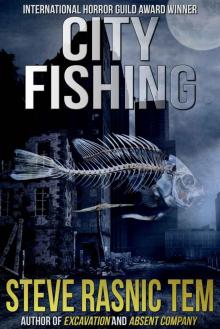 City Fishing
City Fishing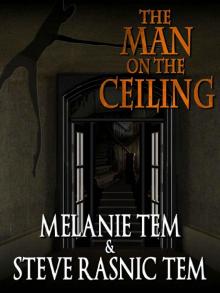 The Man on the Ceiling
The Man on the Ceiling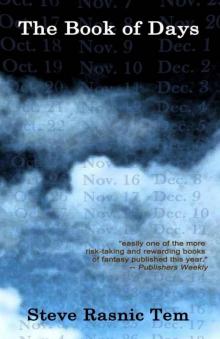 The Book of Days
The Book of Days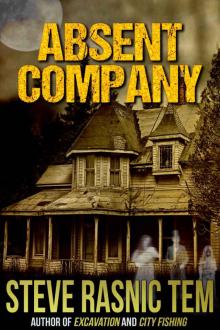 Absent Company
Absent Company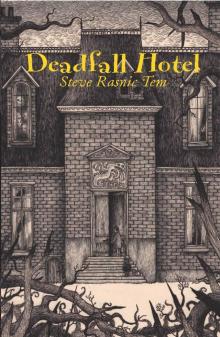 Deadfall Hotel
Deadfall Hotel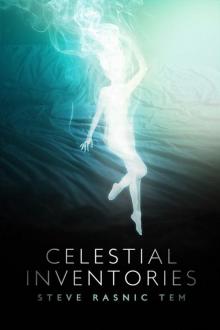 Celestial Inventories
Celestial Inventories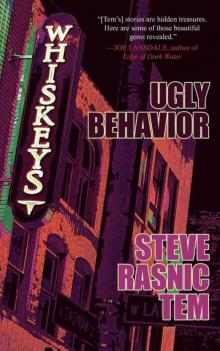 Ugly Behavior
Ugly Behavior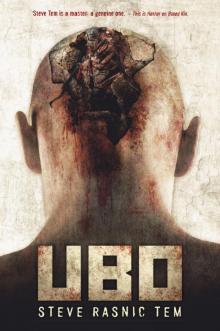 Ubo
Ubo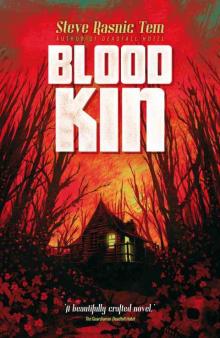 Blood Kin
Blood Kin